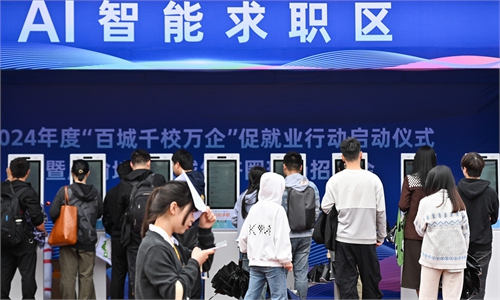IN-DEPTH / IN-DEPTH
Returning overseas graduates devoted to rural revitalization through 'village cafes'
Next stop, hometown
Editor's Note:
The youth are the vanguards of our time, showcasing boundless energy and vibrant personalities.
Gen-Zers not only represent the makers of the future but also serve as agents of change in the present. With an open mindset and an international outlook, they actively integrate into the currents of globalization, engaging in deep exchanges, and collaborating with youth from around the world to explore pathways and strategies to address global challenges.
The Global Times launched the "Voice from Gen Z" series, which focuses on the proactive actions and innovative achievements of young people in areas such as global governance, cultural exchange, environmental protection, and technological innovation. Through this column, we aim to showcase the unique charm and future leadership of global Gen-Zers.
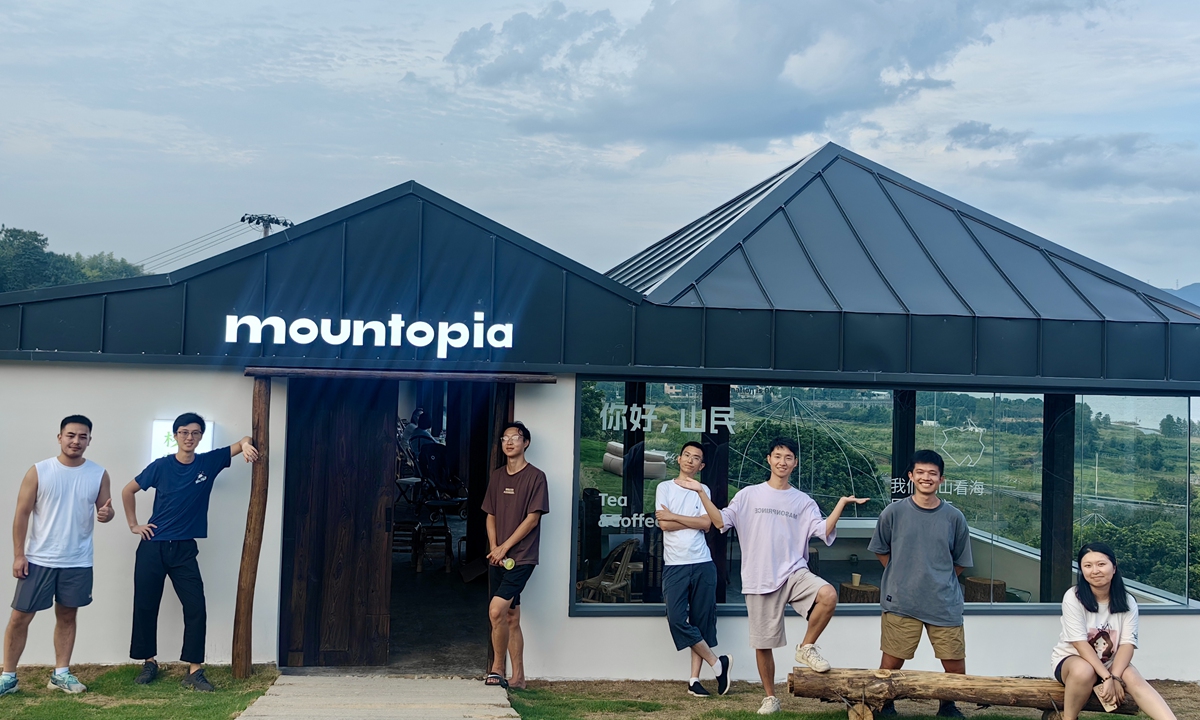
This summer, China will not only see many places baking in hot temperatures, but will also witness 12 million graduates entering the hot job season.
Statistics from the Ministry of Education estimate that the number of college graduates this year is expected to reach 11.79 million, an increase of 210,000 people year-on-year.
From 7.27 million in 2014 to 8.2 million in 2018, and 9.09 million in 2021, behind the growing numbers are the mounting employment pressures faced by college students who are about to enter society. Many industry survey reports have shown that more and more Chinese graduates are prioritizing stable jobs in government agencies or companies.
However, there is also a rising number of young people who opt for different pursuits.
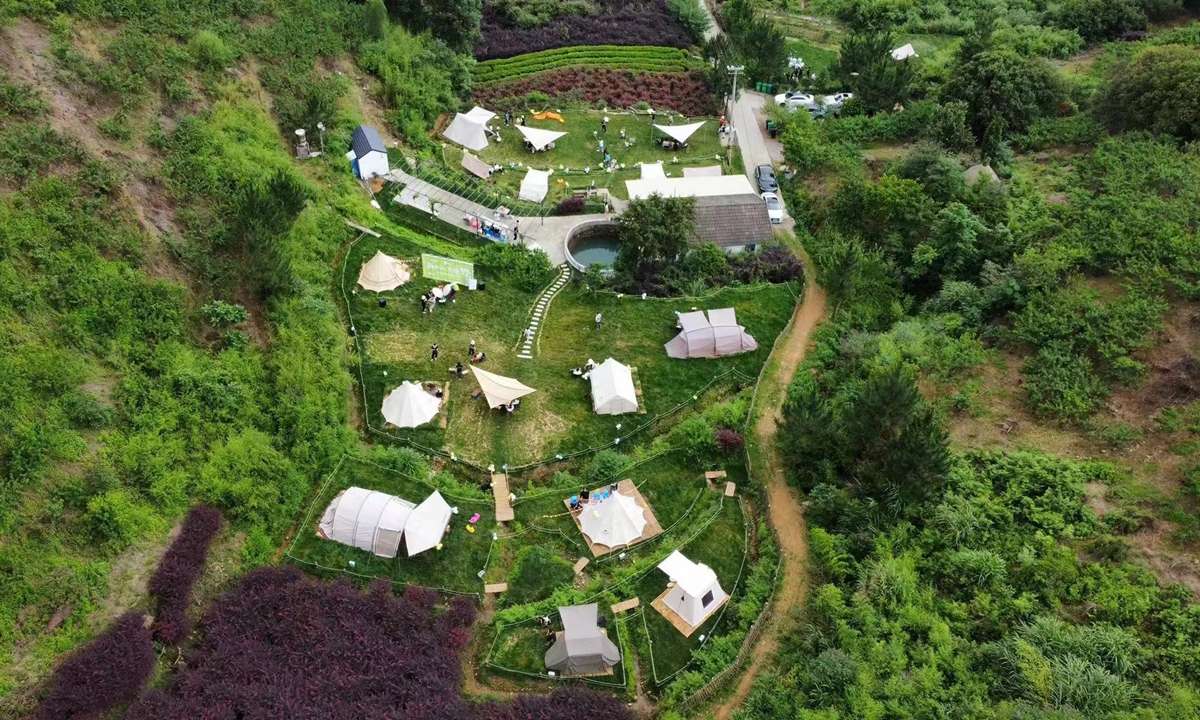
Urban lifestyle in mountains
"I've hardly considered alternatives to going home," Li Zaipei, a graduate with a degree in automatic engineering, blurted out about his plans.
Born in 1996 in Henglu village, in East China's Zhejiang Province, Li believes that nature is the spiritual home of urbanites. With this business insight and a deep affection for his hometown, Li decided to return to the village and establish a coffee brand with the concept of "escaping to the mountains," catering to those feeling tired in the big cities and offering them relaxation and solace in nature.
Over the years, Li and his young team, consisting of graduates from the US and the UK, have utilized their professional knowledge and international perspectives to gradually carve out a new path for his hometown's prosperity -- village cafes.
Traditionally, graduates who return to rural areas and attempt to start businesses hedge their bets on countryside tourism, agricultural products, and fruit picking. However, Li broke away from such development scenarios, and brought the city concept of "drinking coffee" to the countryside, moving the lifestyle to which young people are accustomed to the rural setting, creating a "paradise" where young people can escape the city's hustle and bustle while not being completely detached from urban life.
"Breathe, relax, that's all." This is the slogan on the glass window of Li's coffee shop. Born and raised in Siming Mountain, Li knows well the appeal of nature to urban dwellers.
"After staying in the concrete jungle of the cities for a long time, people will always long to breathe fresh air. This might be an opportunity for me to create a business while making some contributions to my hometown," Li said.
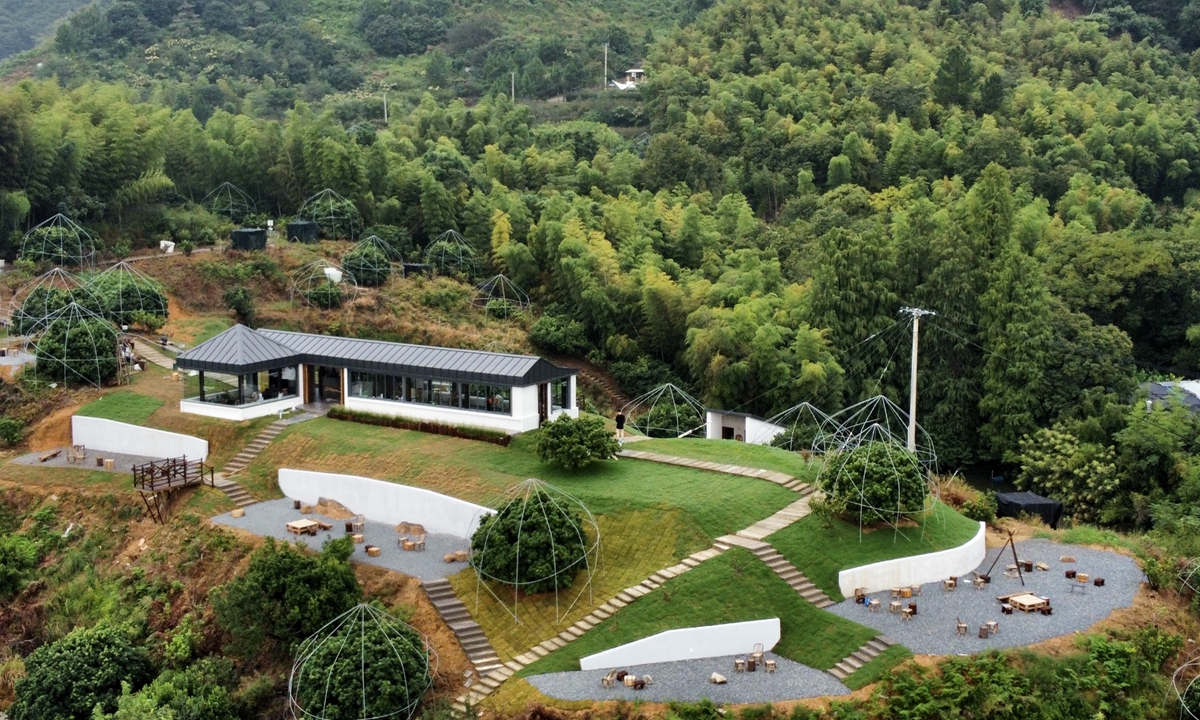
Spiritual home for city dwellers
Selling coffee here? Will anyone really come? Why would young people come to the countryside to drink coffee? At first, villagers in Henglu didn't understand.
After a year of exploration, Li gave the answer - "What we are selling is not just coffee, but emotional value."
As the oldest member, Li's entrepreneurial team consists of a group of talented youth with diverse backgrounds. Alan and Zhu Chuansheng who graduated from the US are Li's co-founder and manager of the coffee house. Jin Fanjia, a graduate of Yale University with a major in management, is responsible for brand consulting; Penny, who graduated from a marketing-related program in the UK, oversees the online brand operations; and Jason, a designer from Chengdu, Southwest China's Sichuan Province, is responsible for the visual elements on the coffee shop's social media platforms and offline activities.
In their coffee house, Li and his team use popular visual design elements, the concept of "aesthetic economy," and "Daka economy."
To put it simply, they hired professional photographers to take free photos for visitors, fully meeting the social needs of young people to take photos and post them on their WeChat Moments. Meanwhile, they encourage visitors to upload pictures or videos on popular social media platforms such as Douyin, Kuaishou, and Xiaohongshu (Little Red Book) to attract more young people to come here. This lifestyle, developed by young Chinese people, refers to Daka, meaning "punching the card," which has become a subculture in the country.
In summer, they also add local specialty fruits to coffee to arouse customer curiosity. With the influx of traffic, it quickly became a popular internet-famous coffee spot in the Yangtze River Delta region.
"Village cafes" have become a vivid reflection of the changes in rural development. Blending in local culture, they allow visitors to enjoy the peaceful taste of coffee while experiencing the charming appearance of the village, Li said. "While bringing in more visitors, village cafes are also driving the development of local tourism-related industries such as catering and accommodation."
Moreover, according to Li, two artists from the Royal College of Art in London, after being inspired by his entrepreneurial story, began to conduct a field survey to see if they could start a business - holding art exhibitions in the village.
"After studying abroad, we came back to work in rural China - this is the life that we want," Li's team told the Global Times. "Like a magical key, village cafes open up more possibilities for rural development. We hope to continue to explore the unlimited possibilities of the Chinese countryside as the spiritual home of city dwellers."
Wu Zhuoran, Zheng Lintong, Shi Keyi, Ge Xuan, Xu Shaohang, Wang Jiahong, and Ma Yunzhe from the Communication University of China contributed to this story
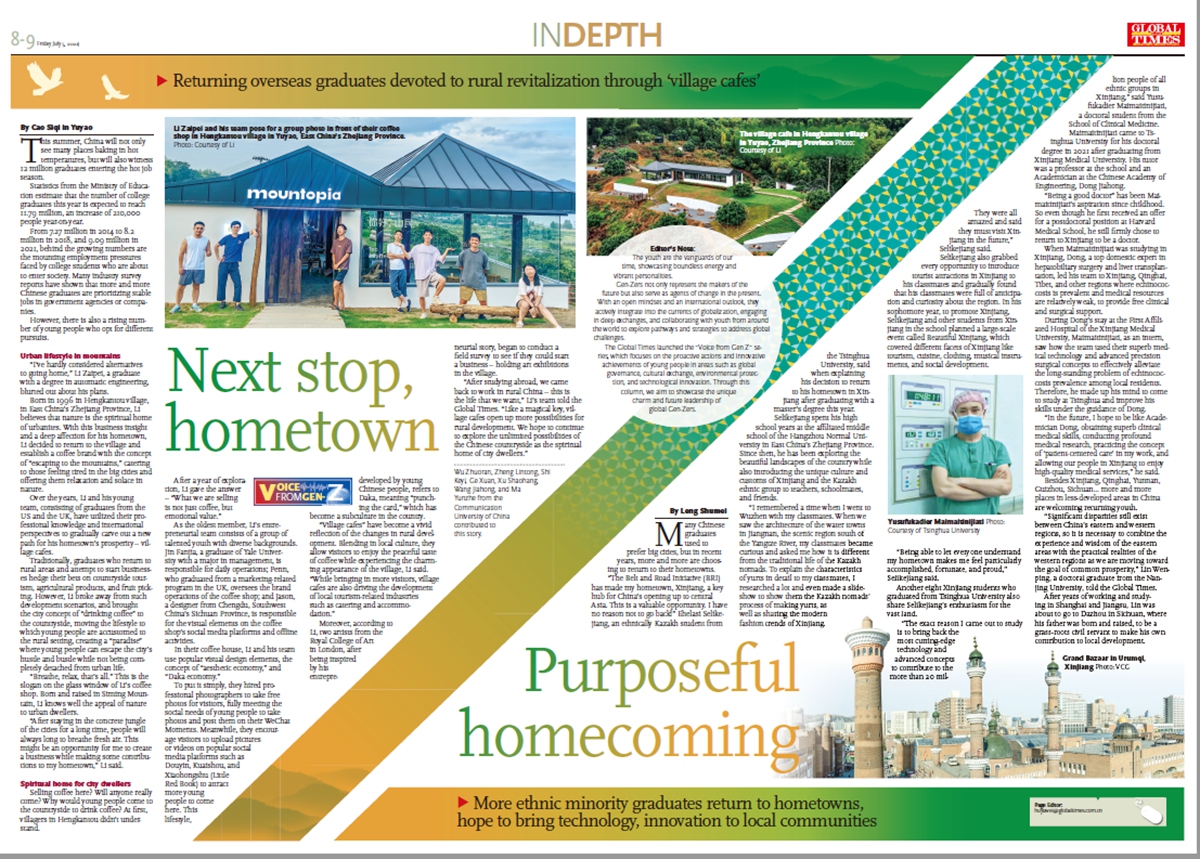
The youth are the vanguards of our time, showcasing boundless energy and vibrant personalities.
Gen-Zers not only represent the makers of the future but also serve as agents of change in the present. With an open mindset and an international outlook, they actively integrate into the currents of globalization, engaging in deep exchanges, and collaborating with youth from around the world to explore pathways and strategies to address global challenges.
The Global Times launched the "Voice from Gen Z" series, which focuses on the proactive actions and innovative achievements of young people in areas such as global governance, cultural exchange, environmental protection, and technological innovation. Through this column, we aim to showcase the unique charm and future leadership of global Gen-Zers.

Li Zaipei and his team pose for a group photo in front of their coffee shop in Henglu village in Yuyao, East China's Zhejiang Province. Photo: Courtesy of Li
This summer, China will not only see many places baking in hot temperatures, but will also witness 12 million graduates entering the hot job season.
Statistics from the Ministry of Education estimate that the number of college graduates this year is expected to reach 11.79 million, an increase of 210,000 people year-on-year.
From 7.27 million in 2014 to 8.2 million in 2018, and 9.09 million in 2021, behind the growing numbers are the mounting employment pressures faced by college students who are about to enter society. Many industry survey reports have shown that more and more Chinese graduates are prioritizing stable jobs in government agencies or companies.
However, there is also a rising number of young people who opt for different pursuits.

The aerial view of a camping site near Li's coffee house in Henglu village in Yuyao, Zhejiang Province Photo: Courtesy of Li
Urban lifestyle in mountains
"I've hardly considered alternatives to going home," Li Zaipei, a graduate with a degree in automatic engineering, blurted out about his plans.
Born in 1996 in Henglu village, in East China's Zhejiang Province, Li believes that nature is the spiritual home of urbanites. With this business insight and a deep affection for his hometown, Li decided to return to the village and establish a coffee brand with the concept of "escaping to the mountains," catering to those feeling tired in the big cities and offering them relaxation and solace in nature.
Over the years, Li and his young team, consisting of graduates from the US and the UK, have utilized their professional knowledge and international perspectives to gradually carve out a new path for his hometown's prosperity -- village cafes.
Traditionally, graduates who return to rural areas and attempt to start businesses hedge their bets on countryside tourism, agricultural products, and fruit picking. However, Li broke away from such development scenarios, and brought the city concept of "drinking coffee" to the countryside, moving the lifestyle to which young people are accustomed to the rural setting, creating a "paradise" where young people can escape the city's hustle and bustle while not being completely detached from urban life.
"Breathe, relax, that's all." This is the slogan on the glass window of Li's coffee shop. Born and raised in Siming Mountain, Li knows well the appeal of nature to urban dwellers.
"After staying in the concrete jungle of the cities for a long time, people will always long to breathe fresh air. This might be an opportunity for me to create a business while making some contributions to my hometown," Li said.

The village cafe in Henglu village in Yuyao, Zhejiang Province Photo: Courtesy of Li
Spiritual home for city dwellers
Selling coffee here? Will anyone really come? Why would young people come to the countryside to drink coffee? At first, villagers in Henglu didn't understand.
After a year of exploration, Li gave the answer - "What we are selling is not just coffee, but emotional value."
As the oldest member, Li's entrepreneurial team consists of a group of talented youth with diverse backgrounds. Alan and Zhu Chuansheng who graduated from the US are Li's co-founder and manager of the coffee house. Jin Fanjia, a graduate of Yale University with a major in management, is responsible for brand consulting; Penny, who graduated from a marketing-related program in the UK, oversees the online brand operations; and Jason, a designer from Chengdu, Southwest China's Sichuan Province, is responsible for the visual elements on the coffee shop's social media platforms and offline activities.
In their coffee house, Li and his team use popular visual design elements, the concept of "aesthetic economy," and "Daka economy."
To put it simply, they hired professional photographers to take free photos for visitors, fully meeting the social needs of young people to take photos and post them on their WeChat Moments. Meanwhile, they encourage visitors to upload pictures or videos on popular social media platforms such as Douyin, Kuaishou, and Xiaohongshu (Little Red Book) to attract more young people to come here. This lifestyle, developed by young Chinese people, refers to Daka, meaning "punching the card," which has become a subculture in the country.
In summer, they also add local specialty fruits to coffee to arouse customer curiosity. With the influx of traffic, it quickly became a popular internet-famous coffee spot in the Yangtze River Delta region.
"Village cafes" have become a vivid reflection of the changes in rural development. Blending in local culture, they allow visitors to enjoy the peaceful taste of coffee while experiencing the charming appearance of the village, Li said. "While bringing in more visitors, village cafes are also driving the development of local tourism-related industries such as catering and accommodation."
Moreover, according to Li, two artists from the Royal College of Art in London, after being inspired by his entrepreneurial story, began to conduct a field survey to see if they could start a business - holding art exhibitions in the village.
"After studying abroad, we came back to work in rural China - this is the life that we want," Li's team told the Global Times. "Like a magical key, village cafes open up more possibilities for rural development. We hope to continue to explore the unlimited possibilities of the Chinese countryside as the spiritual home of city dwellers."
Wu Zhuoran, Zheng Lintong, Shi Keyi, Ge Xuan, Xu Shaohang, Wang Jiahong, and Ma Yunzhe from the Communication University of China contributed to this story


